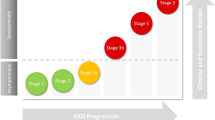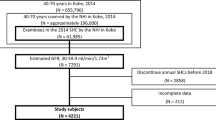Abstract
Background
The relationship between the estimated glomerular filtration rate (eGFR) and cognitive impairment may change as a function of the equation used. We aimed at investigating the association between four different eGFR equations and cognitive impairment among older hospitalized patients.
Methods
Our series consisted of 795 older patients consecutively admitted to 7 geriatric and internal medicine acute care wards. The eGFR was calculated by Chronic Kidney Disease Epidemiologic Collaboration (CKD-EPI), Cockcroft-Gault (CG), Berlin Initiative Study (BIS) and Full Age Spectrum (FAS) equations. Study outcomes were total Mini Mental State Examination (MMSE) < 24 and sub-scores related to orientation to time, orientation to space, registration, calculation, three words recall, language and constructional praxis. Statistical analysis was carried out by logistic or Poisson regressions when appropriate. The accuracy of eGFR equations in identifying cognitive outcomes was investigated by calculating the area (AUC) under the receiver operating characteristic (ROC) curve for each equation.
Results
After adjusting for potential confounders, eGFR < 30 was significantly associated with MMSE < 24 only with CKD-EPI equation (OR 2.03, 95% CI 1.04–3.96). eGFR < 30 was significantly associated with constructional apraxia with all study equations (CKD-EPI: OR 3.62, 95% CI 1.73–7.56; BIS: OR 2.86, 95% CI 1.31–6.26; FAS: OR 2.83, 95% CI 1.44–5.56; CG: OR 2.08, 95% CI 1.09–3.99). The accuracy of eGFR < 30 in identifying patients with defective constructional praxis was poor with all (BIS: AUC 0.54, 95% CI 0.52–0.55; CKD-EPI: AUC 0.55, 95% CI 0.53–0.57; CG: AUC 0.58, 95% CI 0.55–0.61; FAS: AUC 0.56, 95% CI 0.54–0.58).
Conclusions
Constructional apraxia may characterize the cognitive profile of older patients with severe CKD. The accuracy in identifying patients with constructional apraxia is only fair, and studies including other biomarkers of kidney function are needed.
Similar content being viewed by others
References
Mandelli S, Riva E, Tettamanti M et al (2015) Mortality prediction in the oldest old with five different equations to estimate glomerular filtration rate: the health and anemia population-based study. PLoS ONE 10:e0136039
Andersen K, Nybo H, Gaist D et al (2002) Cognitive impairment and mortality among nonagenarians: the Danish 1905 cohort survey. Dement Geriatr Cogn Disord 13:156–163
Webster AC, Nagler EV, Morton RL et al (2017) Chronic Kidney Disease. Lancet 389:1238–1252
McQuillan R, Jassal SV (2010) Neuropsychiatric complications of chronic kidney disease. Nat Rev Nephrol. 6:471–479
Yaffe K, Ackerson L, Kurella Tamura M et al (2010) Chronic kidney disease and cognitive function in older adults: findings from the chronic renal insufficiency cohort cognitive study. J Am Geriatr Soc 58:338–345
Torres RV, Elias MF, Seliger S, et al (2016) Risk for cognitive impairment across 22 measures of cognitive ability in early-stage chronic kidney disease. Nephrology, dialysis, transplantation: official publication of the European Dialysis and Transplant Association - European Renal Association
Zammit AR, Katz MJ, Zimmerman ME et al (2015) Low eGFR is associated with dysexecutive and amnestic mild cognitive impairment. Alzheimer’s & Dementia 1:152–159
Joosten H, Izaks GJ, Slaets JP et al (2011) Association of cognitive function with albuminuria and eGFR in the general population. Clinical J Am Soc Nephrol 6:1400–1409
Konig M, Gollasch M, Spira D et al (2018) Mild-to-moderate chronic kidney disease and geriatric outcomes: analysis of cross-sectional data from the Berlin aging study II. Gerontology 64:118–126
Brodski J, Rossell SL, Castle DJ et al (2019) A systematic review of cognitive impairments associated with kidney failure in adults before natural age-related changes. J Int Neuropsychol Soc 25:101–114
Zammit AR, Katz MJ, Bitzer M et al (2016) Cognitive impairment and dementia in older adults with chronic kidney disease: a review. Alzheimer Dis Assoc Disord 30:357–366
Fan L, Levey AS, Gudnason V et al (2015) Comparing GFR estimating equations using cystatin C and creatinine in elderly individuals. J Am Soc Nephrol 26:1982–1989
Levey AS, Bosch JP, Lewis JB et al (1999) A more accurate method to estimate glomerular filtration rate from serum creatinine: a new prediction equation. Modification of Diet in Renal Disease Study Group. Ann Intern Med 130:461–470
Cockcroft DW, Gault MH (1976) Prediction of creatinine clearance from serum creatinine. Nephron 16:31–41
Romijn MD, van Marum RJ, Emmelot-Vonk MH et al (2015) Mild chronic kidney disease is associated with cognitive function in patients presenting at a memory clinic. Int J Geriatr Psychiatry 30:758–765
Schaeffner ES, Ebert N, Delanaye P et al (2012) Two novel equations to estimate kidney function in persons aged 70 years or older. Ann Intern Med 157:471–481
Koppe L, Klich A, Dubourg L et al (2013) Performance of creatinine-based equations compared in older patients. J Nephrol 26:716–723
Levey AS, Stevens LA, Schmid CH et al (2009) A new equation to estimate glomerular filtration rate. Ann Intern Med 150:604–612
Levey AS, Becker C, Inker LA (2015) Glomerular filtration rate and albuminuria for detection and staging of acute and chronic kidney disease in adults: a systematic review. JAMA 313:837–846
Pottel H, Hoste L, Dubourg L et al (2016) An estimated glomerular filtration rate equation for the full age spectrum. Nephrol Dial Transplant 31:798–806
Tosato M, Settanni S, Antocicco M et al (2013) Pattern of medication use among older inpatients in seven hospitals in Italy: results from the CRiteria to assess Appropriate Medication use among Elderly complex patients (CRIME) project. Current drug Saf 8:98–103
Folstein MF, Folstein SE, McHugh PR (1975) “Mini-mental state”. A practical method for grading the cognitive state of patients for the clinician. J Psychiatr Res 12:189–198
Lesher EL, Berryhill JS (1994) Validation of the geriatric depression scale-short form among inpatients. J Clin Psychol 50:256–260
Katz S, Ford AB, Moskowitz RW et al (1963) Studies of illness in the aged. The index of Adl: a standardized measure of biological and psychosocial function. JAMA 185:914–919
Hales E, Yudofsky JA (eds) (2003) The American psychiatric press textbook of psychiatry. American Psychiatric Publishing Inc, Washington
Blanc B, Finch CA, Hallberg L et al (1968) Nutritional anaemias report of a WHO Scientific Group. WHO Tech Rep Ser 405:1–40
Kertesz A, Harlock W, Coates R (1979) Computer tomographic localization, lesion size, and prognosis in aphasia and nonverbal impairment. Brain Lang 8:34–50
Song SH, Kim IJ, Kim SJ et al (2008) Cerebral glucose metabolism abnormalities in patients with major depressive symptoms in pre-dialytic chronic kidney disease: statistical parametric mapping analysis of F-18-FDG PET, a preliminary study. Psychiatry Clin Neurosci 62:554–561
Claus JJ, Walstra GJ, Bossuyt PM et al (1999) A simple test of copying ability and sex define survival in patients with early Alzheimer’s disease. Psychol Med 29:485–489
Lavery LL, Starenchak SM, Flynn WB et al (2005) The clock drawing test is an independent predictor of incident use of 24-hour care in a retirement community. J Gerontol A Biol Sci Med Sci 60:928–932
Antonelli-Incalzi R, Corsonello A, Pedone C et al (2006) Drawing impairment predicts mortality in severe COPD. Chest 130:1687–1694
Royall DR (2006) Double jeopardy. Chest 130:1636–1638
Antonelli Incalzi R, Corsonello A, Trojano L et al (2009) Heart rate variability and drawing impairment in hypoxemic COPD. Brain Cogn 70:163–170
Kurella M, Chertow GM, Luan J et al (2004) Cognitive impairment in chronic kidney disease. J Am Geriatr Soc 52:1863–1869
Kurella Tamura M, Wadley V, Yaffe K et al (2008) Kidney function and cognitive impairment in US adults: the reasons for geographic and racial differences in stroke (REGARDS) Study. Am J Kidney Dis 52:227–234
Kurella Tamura M, Xie D, Yaffe K et al (2011) Vascular risk factors and cognitive impairment in chronic kidney disease: the chronic renal insufficiency cohort (CRIC) study. Clin J Am Soc Nephrol 6:248–256
Andro M, Le Squere P, Estivin S et al (2013) Anaemia and cognitive performances in the elderly: a systematic review. Eur J Neurol 20:1234–1240
Wei Y, Wei YK, Zhu J (2017) Early markers of kidney dysfunction and cognitive impairment among older adults. J Neurol Sci 375:209–214
Martens RJ, Kooman JP, Stehouwer CD et al (2017) Estimated GFR, albuminuria, and cognitive performance: the Maastricht study. Am J Kidney Dis 69:179–191
Torres RV, Elias MF, Seliger S et al (2017) Risk for cognitive impairment across 22 measures of cognitive ability in early-stage chronic kidney disease. Nephrol Dial Transpl 32:299–306
Yaffe K, Kurella-Tamura M, Ackerson L et al (2014) Higher levels of cystatin C are associated with worse cognitive function in older adults with chronic kidney disease: the chronic renal insufficiency cohort cognitive study. J Am Geriatr Soc 62:1623–1629
Spencer RJ, Wendell CR, Giggey PP et al (2013) Psychometric limitations of the mini-mental state examination among nondemented older adults: an evaluation of neurocognitive and magnetic resonance imaging correlates. Exp Aging Res 39:382–397
Wellens NI, Flamaing J, Tournoy J et al (2013) Convergent validity of the cognitive performance scale of the interRAI acute care and the mini-mental state examination. Am J Geriatr Psychiatry. 21:636–645
Travers C, Byrne GJ, Pachana NA et al (2013) Validation of the interRAI cognitive performance scale against independent clinical diagnosis and the Mini-Mental State Examination in older hospitalized patients. J Nutr Health Aging. 17:435–439
Funding
The CRIME study was partially supported by an unrestricted grant of the Italian Ministry of Health (Grant No. GR-2007-685638). Funder had no role in this paper.
Author information
Authors and Affiliations
Contributions
Elisa Pierpaoli, Katia Fabi, Federica Francesca Lenci and Maddalena Ricci conceived the study and participated in data analysis, manuscript writing and revising, and manuscript approval Mirko Di Rosa participated in data analysis and manuscript writing and approval. Graziano Onder, Stefano Volpato, Carmelinda Ruggiero, Antonio Cherubini and Andrea Corsonello participated in data collection and writing, revising and approving manuscript. Fabrizia Lattanzio participated in writing the manuscript, revising it for important intellectual content, and approval.
Corresponding author
Ethics declarations
Conflict of interest
All Authors declare to have no competing interests with this manuscript.
Human and animal rights
All procedures performed in studies involving human participants were in accordance with the ethical standards of the institutional and/or national research committee and with the 1964 Helsinki declaration and its later amendments or comparable ethical standards.
Informed consent
Informed consent was obtained from all individual participants included in the study.
Additional information
Publisher's Note
Springer Nature remains neutral with regard to jurisdictional claims in published maps and institutional affiliations.
Electronic supplementary material
Below is the link to the electronic supplementary material.
Rights and permissions
About this article
Cite this article
Pierpaoli, E., Fabi, K., Lenci, F.F. et al. Kidney function and cognitive impairment among older hospitalized patients: a comparison of four glomerular filtration rate equations. Aging Clin Exp Res 32, 841–850 (2020). https://doi.org/10.1007/s40520-019-01405-1
Received:
Accepted:
Published:
Issue Date:
DOI: https://doi.org/10.1007/s40520-019-01405-1




